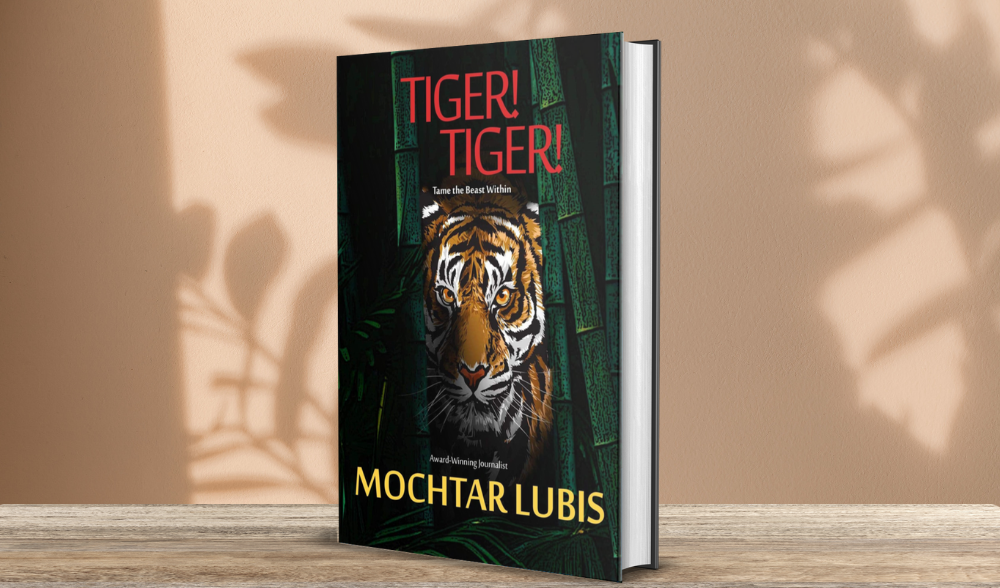GABY RUSLI WRITES (in an ongoing series of Indonesian classics) — Every person has within themselves a personal ‘tiger,’ whether it is vice, trauma, or an immoral act we bury inside of us. We spend our lives trying to subdue this tiger. Some succeed in taming their tigers, while others are overcome by it. Mochtar Lubis proved through his classic work, Tiger! Tiger! (1991) that surrendering to the tiger inside ourselves will only bring us our downfall.

Tiger! Tiger! tells the story of seven men who worked as dammar collectors, a job gathering a type of tree resin used for varnish obtained from the endemic jungle trees of Sumatra. These people found themselves stalked by a Sumatran tiger who sought to ravage them one by one. Feeling defenseless and fearful of dying an excruciating death, they turn to protective talismans and the confession of their past offenses, hoping the tiger will spare them. The idea that the tiger was sent by God to punish them causes each of them to spiral into madness and turn against one another.
Lubis’ tale was inspired by a close encounter with a real tiger after finding a well-built yet abandoned hut in the deep jungles of Sumatra. One of Lubis’ most popular works was Twilight in Djakarta (1963) (see book review), a story exposing the nepotistic and highly corrupt elite and the passive scholars in Indonesian society. He was the first Indonesian and one of only three (to this day) to have received the prestigious Magsaysay Award for Journalism and Literature. Lubis later returned the award in protest when leftist Pramoedya Ananta Toer was also granted the prestigious commendation.

Taking place in the immersive setting of the Sumatran jungle where a ferocious tiger lurks, Tiger! Tiger! triggers deep self-reflection in its readers. Lubis conveys many ideas through his work, but the most apparent is his psychological approach to human nature. In physical and spiritual form, the wild animal symbolizes life’s trials and tribulations while simultaneously also representing one’s deepest fears and regrets.
When the first of the seven men is attacked, he becomes repentant of his sins. He also reveals another man’s sins in the group without any warning. The rest start thinking of their personal offenses, wondering if and when their sins will be unveiled. This creates a toxic dynamic where everyone is trying to fend for themselves. To have one’s vulnerabilities exposed so openly and without one’s choice in the matter indeed is a disconcerting and threatening concept.
Mochtar Lubis condemns the charismatic leader archetype visible in politicians and shamans, both of which are authority figures in Indonesia. His prose points out that black magic, charisma, or both will not protect one in the event of imminent danger, despite the illusions of security that authority figures exude. Lubis reminds superstitious believers of the frailty of such methods of protection, much like how a leader such as Soekarno, Indonesia’s first president after its independence from the Dutch, could not use his glorified and feared aura of charisma and mystery to become the leader Indonesia needed. Instead, Soekarno was known to make decisions against the Indonesian people’s best interest.
One should read Tiger! Tiger! with an open mind. Without it, the book will only be misunderstood as a fictitious, exotic tale of a lush, eastern landscape. Such a powerful story was meant to be one man’s critique of the multi-faceted identity of his nation and its people. The reader does not have to share the same values as Lubis to understand his intentions and celebrate his work. After all, it is through the exchange of different opinions that allow societies to advance into the future.

Book Reviewer, Gaby Rusli, is an LMU International Relations graduate and environmentalist who is passionate about Indonesian and Southeast Asian political affairs.
Edited by book review editor-in-chief, Ella Kelleher.


Well done, personally I think overjoyed I discovered the blogs.
Your website and the information you have provided is very great. I wish you continued success, I found the exact information I was looking for in your article, thank you.
Great article thank you , that what i was looking for.